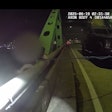The detective rapped on the front door. Then three seconds later, instead of waiting for a resident to answer, one of the officers on his team kicked in the door.
They had expected to find a meth lab in the apartment, but the man and woman they'd awakened in the middle of the night and handcuffed had committed no crimes. The officers had raided the wrong apartment.
The couple retained legal counsel and asserted multiple Section 1983 claims against the detective, his team of officers, their department, the mayor, and other government officials. After extensive litigation, the court of appeals held that the detective was not entitled to qualified immunity. So his failure to ascertain the proper target of the warrant and his failure to follow the knock-and-announce rule jeopardized his career and crippled his personal finances.
By understanding the knock-and-announce rule, you can prevent this from happening to you.
Wrong and Dangerous
Some police departments have interpreted the Supreme Court's recent Hudson v. Michigan ruling as a license to execute warrants without knocking, announcing, and waiting a reasonable amount of time for a resident to answer the door before entering. That interpretation is both wrong and dangerous.
Failure to adhere to the requirements of the knock-and-announce rule can result in terrible tragedy and extremely expensive litigation. Perhaps the most infamous example of this is the Nov. 21, 2006, shooting death of 92-year-old Kathryn Johnston during a botched no-knock drug raid by officers from the Atlanta Police Department.
To cover up the fact that Johnston was innocent, the investigators who had executed the search planted marijuana at her home and later attempted to coerce an informant to claim that he had purchased cocaine at her home.
The results have been devastating for the Atlanta PD. On April 26, 2007, two of the officers who performed the illegal search pleaded guilty to voluntary manslaughter, perjury, and other criminal charges. The drug informant who was coerced by the officers plans to sue the department and the city. The investigation into the shooting of Kathryn Johnston and other possible related acts of law enforcement misconduct is ongoing.
Let's take a detailed look at the knock-and-announce rule and discuss when and why you can be sued for failing to knock and announce.
This is Nothing New
The requirement that law enforcement officers must knock and announce their presence before entering a residence is not a new rule. Under the common law, police officers could not forcibly enter a residence to execute a search warrant unless they first knocked at the door, identified themselves as officers of the law, articulated their reason for requesting admittance into the home, and were refused admittance.
This requirement was clarified in the 1995 Supreme Court case Wilson v. Arkansas in which the Court unanimously held that the common law knock-and-announce "principle forms a part of the reasonableness inquiry under the Fourth Amendment." Therefore, "the reasonableness of a search of a dwelling may depend in part on whether law enforcement officers announced their presence and authority prior to entering."
Proponents of the knock-and-announce rule assert that 1) it protects life and limb because a resident may mistake an unannounced police entry for a criminal invasion and brandish a weapon in defense; 2) it protects property by giving the occupant the opportunity to admit the officers; 3) and it protects privacy and preserves dignity by reducing the risk that the police will enter the wrong residence and even when there was no mistake about the place to be searched, permits those within to have a brief notice to prepare for the police entry. For example, if officers knock and announce their presence, a nude resident might have time to don a robe before officers enter his bedroom.
Even when the entry is made without force such as when the door to the residence is not locked or an apartment manager agrees to open the door, you must ordinarily observe the requirement to knock and announce before entering. Some courts have even ruled that you must first announce your presence before entering a wide open door.[PAGEBREAK]
To comply with the notice requirements under the knock-and-announce rule, you must identify yourselves as police and indicate that you are at the home to execute a search warrant. After this announcement is made, you must wait a reasonable time for an occupant of the premises to admit you. If you are denied entry or there is no response from within the residence, you may proceed with a forcible entry if necessary.
The Supreme Court first addressed how much delay is necessary before forcible entry in United States v. Banks. They concluded that a 15- to 20-second wait by the police before they forced the door open with a battering ram was sufficient because the police had reason to believe that if they waited longer, Banks would destroy his suspected stash of cocaine. The officers that executed the search were unaware that Banks was showering when they knocked on the door. The Court reasoned, "[T]he facts known to the police are what count in judging reasonable waiting time."
In addition to destruction of evidence, the Supreme Court has recognized other situations where police do not have to knock and announce:
- A reasonable suspicion of a threat of physical violence to the officers or someone within the residence
- A reasonable suspicion that knocking and announcing would be futile
- A hot pursuit of a fleeing criminal
With regard to futility, proof that officers have made a demand for entry and that entry has been refused has been deemed unnecessary.
Reasonable suspicion rather than probable cause is the appropriate showing when a no-knock entry is challenged. The Supreme Court has also rejected a bright-line rule that certain categories of cases such as narcotics investigations should always be exempt from knock and announce. Instead, the Court requires a case-by-case, totality-of-the-circumstances analysis.
The Evidence May Still be Accepted
Perhaps the most important Supreme Court decision involving the knock-and-announce rule was handed down last summer. In Hudson v. Michigan, the Court considered whether narcotics and firearms that were seized during a search should be suppressed because the Detroit police officers who executed the search warrant failed to observe the knock-and-announce rule. The officers did announce their presence, but they waited only a short time—perhaps three to five seconds—before opening the unlocked front door and entering Booker Hudson's home.
Because Michigan conceded that the officers had violated knock and announce, the sole issue was whether to apply the exclusionary rule.
In delivering the opinion of the Court, Justice Scalia concluded that violation of the knock-and-announce rule does not require application of the exclusionary rule. He wrote that the exclusion of evidence was not warranted because "the constitutional violation of an illegal manner of entry was not a but-for cause of obtaining the evidence." Scalia based his opinion on the fact that the police would have executed the warrant and found the guns and cocaine even without the violation.
Furthermore, Scalia adds that even if the violation were the but-for cause of the seizure that would not necessarily be a sufficient condition for suppression. "[W]e have never held that evidence is 'fruit of the poisonous tree' simply because 'it would not have come to light but for the illegal actions of the police.'"
In addition, the Court's decision said that the exclusionary rule is not an appropriate remedy for a knock-and-announce violation. The Court reasoned that the threats of internal police discipline and civil suits were effective motivators to prompt officers to follow the knock-and-announce rule.
To sum up, in Hudson v. Michigan the Supreme Court decided that the exclusionary rule was not an appropriate remedy for a knock-and-announce violation. But let's be clear on this: It did not abolish the knock-and-announce rule. On the contrary, the Court reiterated reasons that the rule should be followed and emphasized that plaintiffs have the right to sue law enforcement officers who violate their constitutional rights.[PAGEBREAK]
Causes of Action from Knock-and-Announce Violations
Let's say that you failed to knock and announce prior to executing a search warrant. Here's a look at some of the causes of action that infuriated plaintiffs can file against you and your agency.
Civil Rights Violations
After the Civil War, Congress enacted the Federal Civil Rights Act, Title 42, United States Code Section 1983, to provide Americans with a remedy for unlawful arrests, detentions, or killings committed by police. Also, under 42 U.S.C. Section 1988(b), Congress authorized attorney's fees for civil rights plaintiffs. However, because most plaintiffs in these cases do not prevail, recovery of attorney's fees is by no means certain.
In order for a plaintiff to state a claim under Section 1983, he or she must allege the violation of a right secured by the laws of the United States, and must show that the alleged deprivation was committed by a person who was acting under color of state law.
Plaintiffs asserting Section 1983 claims arising from knock-and-announce violations have advanced many different theories of liability. The following list should be treated as an introduction, not a complete summary of all available remedies:
- Danger Creation Doctrine—This is invoked when the plaintiff argues that your action placed the plaintiff in danger. For example, if in the middle of the night you force a man to wait alone outside his home while it is being searched, and someone robs and beats him, you may be liable for his injuries.
- The Fourth and Fourteenth Amendment Right to Bodily Privacy—You violate the right to bodily privacy when you cause the plaintiff's unclothed body to be seen by strangers. If you force a partially unclothed woman to wait in the lobby while you search her apartment and she is seen by one of her neighbors, then she may be able to assert this claim.
- Section 1983 Liability for the Acts of Others—An officer, even if he is not a supervisor, can be held liable for other officers' acts. An officer subjects someone to the deprivation of a constitutional right within the meaning of Section 1983 if he or she does an affirmative act, participates in someone else's affirmative acts, or omits to perform an act that the officer is legally required to perform, and that dereliction of duty causes the deprivation of the plaintiff's rights.
You don't have to personally participate in the act to be held liable. If you set in motion a series of acts by others that you knew or reasonably should have known would cause others to inflict the constitutional injury, you can be held liable.
- Conspiracy Liability—If you join in a plan with one or more other officers or supervisors and that plan results in a deprivation of constitutional rights, you may be held liable as a co-conspirator under Section 1983. Although a plaintiff may introduce circumstantial evidence to provide proof of conspiracy, vague allegations unsupported by material facts will not be sufficient to state a claim.
- Liability for Failure to Prevent Harm to Others—If you were in a position to prevent constitutional injuries that were inflicted by another officer and you failed to take action to prevent those injuries, you may be held liable under Section 1983. In order for liability to attach, you must have had a duty, not performed the duty, and there must be a relationship between the failure to perform and the duty. Also, damage or injury must result.
State Law Intentional Torts
In addition to Section 1983 claims, plaintiffs may also seek redress through state law intentional tort causes of action. These include but are not limited to: assault, battery, trespass, false imprisonment, false arrest, intentional infliction of emotional distress, and breaking and entering. Depending upon the laws of the jurisdiction, the government may be prohibited from paying punitive damages on the officer's behalf if they are awarded to the plaintiff.
Here's What to Do If You Get Sued
As discussed above, unless you have a reasonable suspicion that exigent circumstances exist, you must follow the knock-and-announce rule before entering a residence to execute a search warrant. Having passion for your job is admirable, but don't let your enthusiasm make you forget the risks of committing a constitutional violation.
If something does go wrong during a search and you are sued by a plaintiff, don't panic. The good news is that most officers who are sued don't lose their jobs, get demoted, or suffer financial hardships because of the lawsuit.
But don't shove the summons and complaint in a drawer and hope it will disappear. Speak to your supervisor and provide him or her with a copy of all legal papers. Then confirm that your agency's legal department or the outside attorney who represents officers in your agency and others who need to know about the matter are notified.
Finally, don't be afraid to call on others within or outside your department for support. Litigation can be a painful experience but, if you cooperate with your counsel and behave professionally, you have an excellent chance of coming out of it relatively unscathed.
Alicia M. Hilton is a visiting professor of law at the DePaul University College of Law in Chicago. Prior to becoming an attorney, she was an FBI Special Agent who worked undercover in two long-term criminal cases, posing as a drug dealer with ties to organized crime.

















